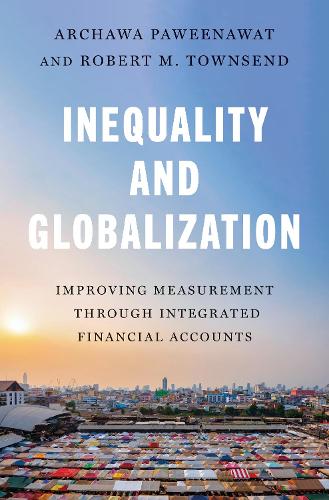
Inequality and Globalization: Improving Measurement through Integrated Financial Accounts
(Hardback)
Publishing Details
Inequality and Globalization: Improving Measurement through Integrated Financial Accounts
By (Author) Archawa Paweenawat
By (author) Robert M. Townsend
Princeton University Press
Princeton University Press
16th October 2024
United States
Classifications
Tertiary Education
Non Fiction
Globalization
International economics
Economics
339.2072
Physical Properties
Hardback
240
Width 156mm, Height 235mm
Description
A remedy for the gap between micro and macro data, making measures of inequality and national income consistent with each other
Increasing inequality, the impact of globalization, and the disparate effects of financial regulation and innovation are extraordinarily important topics that fuel spirited policy debates. And yet the facts underlying these debates are of doubtful accuracy. In reality, as Archawa Paweenawat and Robert Townsend show in Inequality and Globalization, there is a large gap between micro household surveys, which measure key outcomes such as inequality, and aggregated financial accounts, which measure macroeconomic totals and growth. Paweenawat and Townsend propose a remedy: integrated financial accounts, in which the flows in income statements, including saving and investment, are consistent with the changes in financial assets and liabilities in the balance sheet at micro and macro levels. None of the leading US micro household surveys or macro accounts meets this criterion.
Drawing on extensive data from field work in Thailand, Paweenawat and Townsend show how consistent integrated financial accounts at the individual household and small enterprise level can be created using household and firm survey data. Aggregated to the village level, these accounts can link anecdotal stories of individual households to their financial accounts, document the real impact on them from growth, and assess what would have happened to them if trade and financial liberalization had not been allowed. Paweenawat and Townsend then describe the next logical step: creating integrated financial accounts for the United States, working from the ground up and the top down. Only with these integrated accounts will policy debates on inequality and globalization have a solid factual basis.
Author Bio
Archawa Paweenawat, a development economist, is Head of Business Research of the Puey Ungphakorn Institute for Economic Research at the Bank of Thailand. Robert M. Townsend is the Elizabeth and James Killian Professor of Economics in the Department of Economics at the Massachusetts Institute of Technology. He is the author of Distributed Ledgers: Design and Regulation of Financial Infrastructure and Payment Systems, Chronicles from the Field: The Townsend Thai Project, Households as Corporate Firms: An Analysis of Household Finance Using Integrated Household Surveys and Corporate Financial Accounting.
